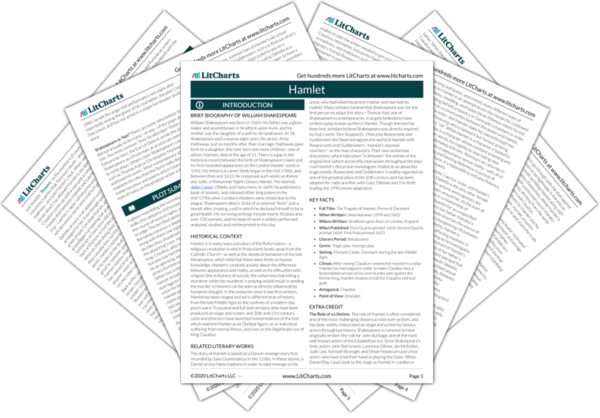
Welcome to the LitCharts study guide on William Shakespeare's Hamlet. Created by the original team behind SparkNotes, LitCharts are the world's best literature guides.
William Shakespeare was born in 1564. His father was a glove-maker and assemblyman in Stratford-upon-Avon, and his mother was the daughter of a well-to-do landowner. At 18, Shakespeare wed a woman eight years his senior, Anne Hathaway; just six months after their marriage, Hathaway gave birth to a daughter. She later bore two more children—one of whom, Hamnet, died at the age of 11. There is a gap in the historical record between the birth of Shakespeare’s twins and his first recorded appearance on the London theater scene in 1592. His theatrical career likely began in the mid-1580s, and between then and 1613, he composed such works as Romeo and Juliet , A Midsummer Night’s Dream , Hamlet , The Henriad , Julius Caesar , Othello , and many more. In 1609, he published a book of sonnets, and released other long poems in the mid-1590s when London’s theaters were closed due to the plague. Shakespeare died in 1616 of a rumored “fever” just a month after creating a will in which he declared himself to be in good health. His surviving writings include nearly 40 plays and over 150 sonnets, and his body of work is widely performed, analyzed, studied, and reinterpreted to this day.
Get the entire Hamlet LitChart as a printable PDF."My students can't get enough of your charts and their results have gone through the roof." -Graham S.

Hamlet is in many ways a product of the Reformation—a religious revolution in which Protestants broke away from the Catholic Church—as well as the skeptical humanism of the late Renaissance, which held that there were limits on human knowledge. Hamlet's constant anxiety about the difference between appearance and reality, as well as his difficulties with religion (the sinfulness of suicide, the unfairness that killing a murderer while the murderer is praying would result in sending the murder to heaven) can be seen as directly influenced by humanist thought. In the centuries since it was first written, Hamlet has been staged and set in different eras of history, from the late Middle Ages to the confines of a modern-day psych ward. Truncated and full-text versions alike have been produced on stage and screen, and 20th and 21st-century casts and directors have launched interpretations of the text which examine Hamlet as an Oedipal figure, as an individual suffering from mental illness, and even as the illegitimate son of King Claudius.
The story of Hamlet is based on a Danish revenge story first recorded by Saxo Grammaticus in the 1100s. In these stories, a Danish prince fakes madness in order to take revenge on his uncle, who had killed the prince's father and married his mother. Many scholars believe that Shakespeare was not the first person to adapt this story—Thomas Kyd, one of Shakespeare’s contemporaries, is largely believed to have written a play known as the Ur-Hamlet . Though the text has been lost, scholars believe Shakespeare was directly inspired by Kyd’s work. Tom Stoppard’s 1966 play Rosencrantz and Guildenstern Are Dead reimagines the world of Hamlet with Rosencrantz and Guildenstern—Hamlet’s doomed courtiers—as the main characters. Their own existential discussions, which take place “in between” the scenes of the original text (which are briefly interwoven throughout the play) rival Hamlet’s discursive monologues. Hailed as an absurdist tragicomedy, Rosencrantz and Guildenstern is widely regarded as one of the greatest plays of the 20th century and has been adapted for radio and film, with Gary Oldman and Tim Roth leading the 1990 movie adaptation.
Key Facts about HamletThe Role of a Lifetime. The role of Hamlet is often considered one of the most challenging theatrical roles ever written, and has been widely interpreted on stage and screen by famous actors throughout history. Shakespeare is rumored to have originally written the role for John Burbage, one of the most well-known actors of the Elizabethan era. Since Shakespeare’s time, actors John Barrymore, Laurence Olivier, Ian McKellen, Jude Law, Kenneth Branagh, and Ethan Hawke are just a few actors who have tried their hand at playing the Dane. When Daniel Day-Lewis took to the stage as Hamlet in London in 1989, he left the stage mid-performance one night after reportedly seeing the ghost of his real father, the poet Cecil Day-Lewis, and has not acted in a single live theater production since.
Shakespeare or Not? There are some who believe Shakespeare did not actually write many—or any—of the plays attributed to him. The most common “Anti-Stratfordian” theory is that Edward de Vere, the Earl of Oxford, wrote the plays and used Shakespeare as a front man, as aristocrats were not supposed to write plays. Others claim Shakespeare’s contemporaries such as Thomas Kyd or Christopher Marlowe may have authored his works. Most contemporary scholarship, however, supports the idea that the Bard really did compose the numerous plays and poems which have established him, in the eyes of many, as the greatest writer in history.